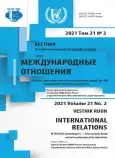The United States - China Rivalry and the BRI
- Authors: Blanchard J.F.1,2
-
Affiliations:
- East China Normal University
- Mr. & Mrs. S.H. Wong Center for the Study of Multinational Corporations
- Issue: Vol 21, No 2 (2021): Intensifying U.S. — Сhina Strategic Rivalry and the Transformation of the Global Order
- Pages: 288-303
- Section: THEMATIC DOSSIER
- URL: https://journal-vniispk.ru/2313-0660/article/view/320315
- DOI: https://doi.org/10.22363/2313-0660-2021-21-2-288-303
- ID: 320315
Cite item
Full Text
Abstract
The article describes the United States - China rivalry and China’s Belt and Road Initiative (BRI) through a fine-grained review of primary materials such as major US policy documents and speeches by and media interviews with key American foreign policy decisionmakers, as well as the selective use of secondary materials such as think tank studies and articles in scholarly publications. It shows that the BRI has fueled the bilateral rivalry since its birth in 2013 and that the rivalry, in turn, has affected US views about the BRI. Under President Barack Obama, the US took a muted stance towards the BRI, expressing modestly cooperative sentiments regarding it. In contrast, under President Donald Trump, Washington’s posture towards the BRI dramatically changed with his administration frequently denigrating the BRI, raising it in major security and foreign policy documents, initiating competing development schemes such as the BUILD Act, and building closer cooperation with allies against China’s venture. Despite its angst about the BRI, however, the Trump administration never launched any large-scale countermeasures. This article contributes to clarifying the situation by correcting some factual errors in past analyses and updating the general understanding about the Trump administration’s response. It systematically contemplates how internal and external economic, political, and ideational factors affected the Obama and Trump administration’s responses to the BRI, demonstrating that such factors shaped or shifted US policy or bounded its form and intensity. These factors, being similar to those stressed by neoclassical realists who emphasize the role of leaders as interpreters within limits of the external environment and responders to it subject to various domestic constraints, provide a foundation which is used to speculate about the US’s probable response to the BRI under President Joseph Biden, Jr.
Keywords
About the authors
Jean-Marc F. Blanchard
East China Normal University; Mr. & Mrs. S.H. Wong Center for the Study of Multinational Corporations
Author for correspondence.
Email: executive_director@mnccenter.org
PhD, Distinguished Professor, School of Advanced International and Area Studies, East China Normal University, China; Executive Director, Mr. & Mrs. S.H. Wong Center for the Study of Multinational Corporations, USA
Shanghai, China; USAReferences
- Ashbee, E. (2020). ‘We don’t drown our partners in a sea of debt’: U.S. policy responses to China’s Belt and Road Initiative. The Journal of American - East Asian Relations, 27(4), 374-400. https://dx.doi.org/10.1163/ 18765610-27040004
- Blanchard, J.-M.F. (2018a). China’s Maritime Silk Road Initiative (MSRI) and Southeast Asia: A Chinese “pond” not “lake” in the Works. Journal of Contemporary China, 27(111), 329-343. https://dx.doi.org/10.1080/ 10670564.2018.1410959
- Blanchard, J.-M.F. (2021а). Belt and Road Initiative (BRI) Blues: Powering BRI research back on track to avoid choppy seas. Journal of Chinese Political Science, 26(1), 235-255. https://dx.doi.org/10.1007/s11366-020-09717-0
- Blanchard, J.-M.F. (Eds.). (2018b). China’s Maritime Silk Road Initiative and South Asia. A political economic analysis of its purposes, perils, and promise. Singapore: Palgrave Macmillan.
- Blanchard, J.-M.F. (Eds.). (2019). China’s Maritime Silk Road Initiative and Southeast Asia. Dilemmas, doubts, and determination. Singapore: Palgrave Macmillan.
- Blanchard, J.-M.F. (Eds.). (2021b). China’s Maritime Silk Road Initiative, Africa, and the Middle East. Feats, freezes, and failures. Singapore: Palgrave Macmillan.
- Boutin, K. (2019). Challenging security: The United States and the Belt and Road Initiative. China and the World, 2(1), 1-23. https://dx.doi.org/10.1142/S259172931950007X
- Chen, S. (2018). Regional responses to China’s Maritime Silk Road Initiative in Southeast Asia. Journal of Contemporary China, 27(111), 344-361. https://dx.doi.org/10.1080/10670564.2018.1410960
- Flint, C., & Zhu, C. (2019). The geopolitics of connectivity, cooperation, and hegemonic competition: The Belt and Road Initiative. Geoforum, 99, 95-101. https://dx.doi.org/10.1016/j.geoforum.2018.12.008
- Goldstein, A. (2020). US - China rivalry in the twenty-first century: Déjà vu and Cold War II. China International Strategy Review, 2, 48-62. https://dx.doi.org/10.1007/s42533-020-00036-w
- Liu, F. (2020). The recalibration of Chinese assertiveness: China’s responses to the Indo-Pacific challenge. International Affairs, 96(1), 9-27. https://dx.doi.org/10.1093/ia/iiz226
- Lobell, S.E., Ripsman, N.M., & Taliaferro, J.W. (2009). Neoclassical realism, the state, and foreign policy. Cambridge: Cambridge University Press.
- Medeiros, E.S. (2019). The changing fundamentals of US - China relations. The Washington Quarterly, 42(3), 93-119. https://dx.doi.org/10.1080/0163660X.2019.1666355
- Rajagopalan, R. (2020). Evasive balancing: India’s unviable Indo-Pacific strategy. International Affairs, 96(1), 75-93. https://dx.doi.org/10.1093/ia/iiz224
- Rathbun, B. (2008). A rose by any other name: Neoclassical realism as the logical and necessary extension of structural realism. Security Studies, 17(2), 294-321. https://dx.doi.org/10.1080/09636410802098917
- Rose, G. (1998). Review: Neoclassical realism and theories of foreign policy. World Politics, 51(1), 144-172.
- Starr, S.F. (2019). US perspectives on China’s Belt and Road Initiative in Central Asia and the South Caucasus. International Studies, 56(2-3), 79-91. https://dx.doi.org/10.1177/0020881719851916
- Sutter, R. (2020). Obama, Trump, and US politics and diplomacy towards Asia. In O. Turner & I. Parmar (Eds.), The US in the Indo-Pacific (pp. 143-160). Manchester: Manchester University Press. https://dx.doi.org/10.7765/9781526135025.00017
- Wang, Y. (2016). Offensive for defensive: The Belt and Road Initiative and China’s new grand strategy. The Pacific Review, 29(3), 455-463. https://dx.doi.org/10.1080/09512748.2016.1154690
- Yung, C. (2021). The crisis in US - China bilateral security relations. Asian Perspective, 45(1), 33-47. https://dx.doi.org/10.1353/apr.0.0002
- Zhao, S. (2020). China’s Belt-Road Initiative as the signature of President Xi Jinping diplomacy: Easier said than done. Journal of Contemporary China, 29(123), 319-335. https://dx.doi.org/10.1080/10670564.2019.1645483
Supplementary files









